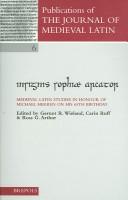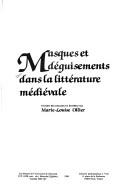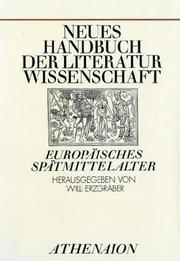| Listing 1 - 10 of 217 | << page >> |
Sort by
|
Book
ISBN: 9780198735359 0198735359 9780199580019 0199580014 9780199580026 0199580022 Year: 2016 Publisher: Oxford New York Oxford University Press
Abstract | Keywords | Export | Availability | Bookmark
 Loading...
Loading...Choose an application
- Reference Manager
- EndNote
- RefWorks (Direct export to RefWorks)
This collaborative two-volume literary history of Europe, the first yet attempted, unfolds through ten sequences of places linked by trade, travel, topography, language, pilgrimage, alliance, disease, and artistic exchange. The period covered, 1348-1418, provides deep context for understanding current developments in Europe, particularly as initiated by the destruction and disasters of World War II. We begin with the greatest of all European catastrophes: the 1348 bubonic plague, which killed one person in three. Literary cultures helped speed recovery from this unprecedented 'ground zero' experience, providing solace, distraction, and new ideals to live by. Questions of where Europe begins and ends, then as now, and disputes over whom truly 'belongs' on European soil are explored, if not solved, through writing. A war that would last for a century convulsed much of western Europe. Divisions between Orthodox and Roman Catholic Christianities endured, and in 1378 the West divided again between popes of Avignon and Rome. Arabic literary cultures linked Fes and Granada to Jerusalem and Damascus; Persian and Turkish writings began to flourish south and west of Constantinople; Jewish intellectuals treasured Arabic texts as well as Hebrew writings; Armenian colophons proved unique. From 1414-18 western nations gathered to heal their papal schism while also exchanging literary, humanist, and musical ideas; visitors from the East hoped for commitment to wider European peace. Freed from nation state historiography, as bequeathed by the nineteenth century, these 82 chapters freshly assess the free movement of European literature in all its variety, local peculiarity, and regenerative power.
Literature --- anno 1400-1499 --- anno 1300-1399 --- Europe --- European literature --- Literature, Medieval --- European literature. --- Literature, Medieval. --- History and criticism. --- Literature [Medieval ]
Periodical
ISSN: 11241020 Year: 1923 Publisher: Bologna Nicola Zanichelli
Abstract | Keywords | Export | Availability | Bookmark
 Loading...
Loading...Choose an application
- Reference Manager
- EndNote
- RefWorks (Direct export to RefWorks)
Literature, Medieval --- Middle Ages --- Literature, Medieval - Periodicals --- Middle Ages - Bibliography --- Italian language --- History --- anno 500-1499 --- Italy
Book
ISBN: 3894920467 9783894920463 Year: 1994 Volume: 25 44 Publisher: Greifswald Reineke
Abstract | Keywords | Export | Availability | Bookmark
 Loading...
Loading...Choose an application
- Reference Manager
- EndNote
- RefWorks (Direct export to RefWorks)

ISBN: 2503514251 9782503514253 9782503538273 2503538274 Year: 2006 Volume: 6 Publisher: Turnhout: Brepols,
Abstract | Keywords | Export | Availability | Bookmark
 Loading...
Loading...Choose an application
- Reference Manager
- EndNote
- RefWorks (Direct export to RefWorks)
Some thirty years ago Michael Herren burst on the medieval Latin scene with his edition and translation of the notoriously difficult Hisperica Famina, and followed this a few years later with his translation of the prose works of Aldhelm. Notice was given that a junior scholar, unafraid to tackle some of the most obscure, complex, and arcane Latin, wished to make it accessible to non-Latinists as well as to those Latinists who lacked his particular skills. Not content with labouring alone in that field, Herren gathered scholars in Toronto to a conference on “Insular Latin Studies,” the proceedings of which he published two years later. Over the years he shed considerable light on such obscure texts and authors as Virgilius Maro Grammaticus, John Scottus Eriugena, and the Cosmographia by the pseudonymous Aethicus Ister. His research trail led him again and again to Ireland, and the Irish contribution to early medieval Latinity and to English, Carolingian, and even Italian culture. Recognizing the rich diversity of medieval Latin, Herren in 1990 founded The Journal of Medieval Latin and has, as its editor, provided a home for medieval Latinists of all stripes.
Book
ISBN: 3533021211 Year: 1968 Publisher: Heidelberg : Winter,
Abstract | Keywords | Export | Availability | Bookmark
 Loading...
Loading...Choose an application
- Reference Manager
- EndNote
- RefWorks (Direct export to RefWorks)
Literature, Medieval --- Romance literature --- History and criticism. --- Comparative literature --- anno 500-1499
Book
ISBN: 9789058679369 9058679365 Year: 2013 Volume: 33 Publisher: Leuven University Press
Abstract | Keywords | Export | Availability | Bookmark
 Loading...
Loading...Choose an application
- Reference Manager
- EndNote
- RefWorks (Direct export to RefWorks)
Manuscripts. Epigraphy. Paleography --- Neo-Latin literature --- History of civilization --- anno 1500-1599 --- anno 1600-1699 --- anno 1400-1499 --- Literature, Medieval --- History and criticism. --- Sociologie de la connaissance --- Academic collection --- Latin literature [Medieval and modern ] --- History and criticism --- Congresses

ISBN: 2760608166 Year: 1988 Publisher: Montréal Presses de l'Université de Montréal
Abstract | Keywords | Export | Availability | Bookmark
 Loading...
Loading...Choose an application
- Reference Manager
- EndNote
- RefWorks (Direct export to RefWorks)
Old French literature --- Thematology --- Disguise in literature --- French literature --- -Literature, Medieval --- -Masks in literature --- European literature --- Medieval literature --- History and criticism --- Disguise in literature. --- Literature, Medieval --- Masks in literature. --- History and criticism. --- Masks in literature --- LITTERATURE MEDIEVALE --- MASQUES --- DEGUISEMENT

ISBN: 3799701397 3891040563 9783799701396 Year: 1978 Publisher: Wiesbaden Athenaion
Abstract | Keywords | Export | Availability | Bookmark
 Loading...
Loading...Choose an application
- Reference Manager
- EndNote
- RefWorks (Direct export to RefWorks)
Literature --- anno 1200-1499 --- Literature, Medieval --- History and criticism --- 82"-/14" --- -European literature --- Medieval literature --- Literatuur. Algemene literatuurwetenschap--?"-/14" --- History and criticism. --- -Literatuur. Algemene literatuurwetenschap--?"-/14" --- 82"-/14" Literatuur. Algemene literatuurwetenschap--?"-/14" --- Literature, Medieval - History and criticism
Periodical
ISSN: 15775003 25070495 Year: 2001 Publisher: Santiago de Compostela : Facultade de Filoloxía, Universidad de Santiago de Compostela,
Abstract | Keywords | Export | Availability | Bookmark
 Loading...
Loading...Choose an application
- Reference Manager
- EndNote
- RefWorks (Direct export to RefWorks)
Medieval Latin literature --- History as a science --- Annuaires --- Jaarboeken --- Literature, Medieval --- Letterkunde. --- Klassieke oudheid. --- History and criticism --- Classical influences --- Periodicals --- Arts and Humanities --- Literature --- European literature --- Medieval literature --- Literature, Medieval. --- Classical influences.
Book
ISBN: 9782503525358 2503525350 9782503539270 Year: 2007 Volume: 10 10 Publisher: Turnhout: Brepols,
Abstract | Keywords | Export | Availability | Bookmark
 Loading...
Loading...Choose an application
- Reference Manager
- EndNote
- RefWorks (Direct export to RefWorks)
Fundamental to all translation work, the concept of “displacement” allows one to take into account the multiple successive states inhering in a single text, and to interpret these variations. Translation is, in effect, a form of transfer; more specifically, it involves a movement from one context to another, be it national, social, political, historical, linguistic or religious. The texts examined here illustrate, each in their unique way, the relationship between contextual change and audience. They are also the product of subtle interactions between a variety of elements, the result of which is a “reinvention” of their respective roles and uses over time. For example, a text intending to entertain may also have educational outcomes; a book of local miracles may attract pilgrims and contribute to the economic life of a monastery; a text and its translations may at some point be appropriated for polemical purposes, while a library of translated texts founded on humanist principals may also serve political ends.Furthermore, each successive adaptation and its accompanying annotations impacts upon the tonality of a text. While this diversity of meanings may inspire some (such as the medieval poet Marie de France), it moreover raises a number of important and difficult questions for the modern translator. How, for example, does one translate the “harmonics” underlying a series of mystical puns? The “solution” usually involves a compromise that both enhances and undermines the translated text.This volume presents a selection of twenty-eight papers delivered at the Seventh International Conference dedicated to The Theory and Practice of Translation in the Middle Ages, which took place at the University of Paris III — Nouvelle Sorbonne in July 2004. The period covered by the texts and their translations extends from antiquity to the present day. The literary and critical breadth of these papers, as well as the rigorous interrogation of the modern translation theory, illustrates the remarkable vitality and diversity of current scholarship in this field Au cœur de toute activité de traduction, le concept de déplacement permet de rendre compte des multiples états successifs d’un même texte et d’en interpréter les variations. Toute traduction est en effet une translation, c’est-à-dire un changement d’environnement, que ce dernier soit national, social, politique, historique, linguistique ou ecclésial. Les textes examinés ici témoignent chacun à sa manière des transformations qu’ils ont subies lorsque, changeant de langue, de style ou d’époque, ils ont changé de destinataires. La dynamique qui les traverse se nourrit de subtils côtoiements: un désir légitime de divertir peut fort bien s’accommoder d’une intention didactique; un recueil de miracles locaux peut attirer des pèlerins, contribuant ainsi à la vie économique d’un monastère; un texte et ses traductions peuvent devenir l’objet d’utilisations polémiques; se constituer en humaniste une bibliothèque de traductions peut aussi servir un dessein politique.Par ailleurs les transpositions successives et leurs gloses, comme en musique, entraînent des changements de tonalité. Ce ‘surplus’ de sens qu’encourage Marie de France pourra cependant se heurter à des résistances: comment par exemple préserver d’une langue à l’autre toutes les harmoniques que libère un enchaînement de jeux de mots mystiques? Ainsi l’inévitable compromis qui s’imposera au traducteur sera souvent le choix d’un enrichissement doublé d’une déperdition.Ce volume présente une sélection des communications entendues lors du septième colloque international consacré à la théorie et la pratique de la traduction des textes au Moyen Age qui s’est tenu à l’Université de Paris III — Sorbonne Nouvelle en juillet 2004. La période couverte par ces textes et leurs traductions s’étend de l’Antiquité jusqu’à nos jours. Ce sont au total vingt-huit études qui sont ici proposées. La richesse des domaines abordés, la haute technicité des analyses, de même que la place faite aux questionnements de la traductologie moderne illustrent la remarquable vitalité des études actuelles relatives aux multiples aspects de la traduction des textes médiévaux.
Translation science --- Historical linguistics --- Literature --- anno 500-1499 --- Translating and interpreting --- History --- Congresses --- Europe --- To 1500 --- Literature [Medieval ] --- Translations --- Traduction --- Translating and interpreting - History - To 1500 --- Translating and interpreting - Europe - Congresses --- Literature, Medieval --- European literature --- Medieval literature --- History and criticism
| Listing 1 - 10 of 217 | << page >> |
Sort by
|

 Search
Search Feedback
Feedback About
About Help
Help News
News